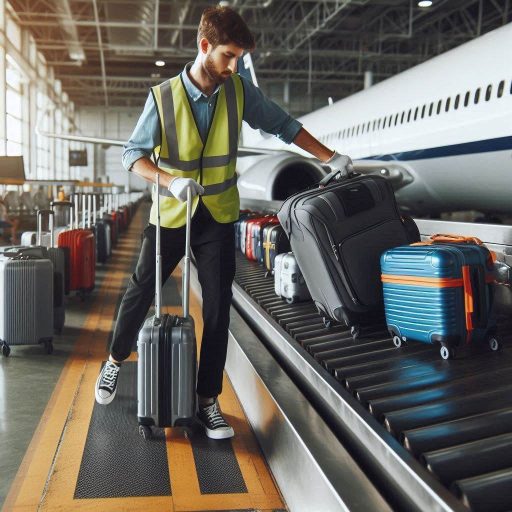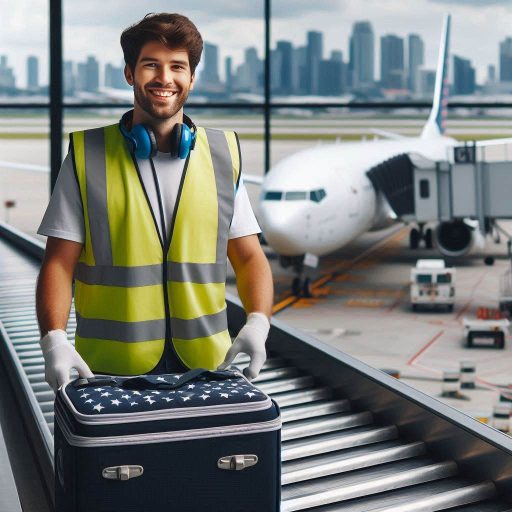Introduction
Baggage handlers manage the loading and unloading of luggage at airports. lets discuss on Baggage Handlers Work-Life Balance.
They ensure that passengers‘ bags are handled safely and efficiently.
Their tasks include operating specialized equipment and following safety protocols.
Baggage handlers often work in fast-paced environments, requiring physical strength and stamina.
They also collaborate closely with other airport staff to ensure smooth operations.
Achieving work-life balance is essential for baggage handlers.
The demanding nature of their job can lead to stress and burnout.
Irregular hours and physical labor make it difficult to maintain personal commitments.
Striking a balance between work and home life promotes overall well-being.
It allows baggage handlers to recharge and remain focused during shifts.
A healthy work-life balance enhances job satisfaction and productivity.
When baggage handlers feel fulfilled outside of work, they perform better on the job.
Additionally, personal time helps them manage stress more effectively.
Prioritizing time for family, hobbies, and self-care can lead to happier employees.
Airlines benefit from employees who maintain a healthy balance.
Improved morale and reduced turnover create a more stable workforce.
Achieving work-life balance is crucial for both baggage handlers and the airline industry.
The Demanding Nature of the Job
Physical and Mental Demands of Being a Baggage Handler
Baggage handling is a physically demanding job.
Workers lift heavy luggage and navigate through crowded airport environments.
This constant physical exertion can lead to fatigue and exhaustion.
Additionally, the role requires workers to be on their feet for long periods.
Repetitive movements can increase the risk of injury, especially to the back and shoulders.
Mental demands are equally significant in this profession.
Baggage handlers must stay focused and alert throughout their shifts.
They often face tight deadlines and must work efficiently to avoid delays.
Handling difficult situations, such as misplaced luggage, can create additional stress.
Effective problem-solving skills are essential in these moments.
Furthermore, baggage handlers must manage customer interactions.
They deal with passengers who may be frustrated or anxious.
Remaining calm and professional while addressing concerns is vital.
This combination of physical and mental demands can lead to burnout if not managed properly.
Impact of Irregular Work Hours and Shift Work on Work-Life Balance
Baggage handlers often work irregular hours, including nights, weekends, and holidays.
This unpredictable schedule can significantly impact work-life balance.
Many workers struggle to maintain personal relationships or engage in social activities.
Irregular hours can disrupt routines, making it difficult to plan time with family or friends.
Shift work can also lead to chronic fatigue.
Working late hours or rotating shifts affects sleep patterns.
Poor sleep quality can result in decreased performance at work and increased stress levels.
Over time, this fatigue can take a toll on both physical and mental health.
Moreover, the unpredictability of work hours can create challenges for family responsibilities.
Baggage handlers with children may find it difficult to attend school events or activities.
Balancing work obligations with personal commitments requires careful planning and flexibility.
Without this balance, stress levels can rise, leading to feelings of overwhelm.
To improve work-life balance, baggage handlers should prioritize self-care.
Engaging in regular exercise can help relieve stress and improve overall health.
Setting aside time for hobbies or relaxation is equally important.
Finding activities that promote well-being can provide a much-needed escape from work-related stress.
Additionally, open communication with supervisors about scheduling needs can help.
When workers express their availability and personal commitments, employers may accommodate their requests.
This collaboration can lead to a more balanced work schedule.
The physical and mental demands of being a baggage handler can be overwhelming.
Irregular work hours and shift work further complicate achieving a healthy work-life balance.
Baggage handlers must prioritize self-care and communication to manage stress effectively.
By taking proactive steps, they can improve their overall well-being and job satisfaction.
Finding that balance is essential for long-term success in this challenging role.
Read: The Role of Technology in Modern Pet Grooming
Strategies for Managing Stress on the Job
Handling Stress in a High-Pressure Environment
Baggage handlers work in a high-pressure environment where stress can accumulate quickly.
To manage stress effectively, start by recognizing your triggers.
Understanding what causes stress helps you respond appropriately.
When situations become overwhelming, practice deep breathing techniques.
Inhale slowly through your nose, hold for a few seconds, and exhale through your mouth.
This simple exercise calms your nervous system and reduces anxiety.
Another useful strategy is to prioritize tasks effectively.
Break your workload into smaller, manageable tasks.
Focus on completing one task at a time to avoid feeling overwhelmed.
This approach increases productivity and helps you maintain a clear mind.
Additionally, stay organized by keeping a checklist.
Checklists ensure that you complete essential duties and reduce the likelihood of forgetting important tasks.
Communicating with colleagues is vital in a high-pressure environment.
Share your concerns or seek help when necessary.
Open communication fosters teamwork and creates a supportive atmosphere.
Having a reliable support system can significantly reduce stress.
Make time for brief check-ins with coworkers to maintain a positive work environment.
Take regular breaks during your shift to recharge.
Step away from the immediate demands of your job, even if just for a few minutes.
Use this time to stretch, hydrate, or grab a quick snack.
Short breaks can enhance focus and help you approach tasks with renewed energy.
Unwinding and Relaxing After Work
After a long day at work, it‘s essential to unwind and recharge.
First, establish a relaxing routine at home.
Create a calming environment by dimming the lights and playing soft music.
Engage in activities that help you relax, such as reading or meditating.
Taking time to unwind promotes mental well-being and reduces stress.
Physical activity is another excellent way to decompress after work.
Exercise releases endorphins, which improve your mood and reduce anxiety.
Consider going for a walk, hitting the gym, or practicing yoga.
Find an activity that you enjoy and can easily incorporate into your routine.
Even a short, brisk walk can make a significant difference in your stress levels.
Connecting with friends and family is crucial for emotional well-being.
Share your experiences from work and discuss your feelings.
Socializing with loved ones provides emotional support and creates a sense of belonging.
Make time for activities with friends or family, such as dinners or game nights.
These moments allow you to recharge and focus on positive interactions.
Don‘t forget to prioritize hobbies and interests outside of work.
Engaging in activities you love can significantly enhance your mood.
Whether it‘s painting, gardening, or playing an instrument, find time for your passions.
These hobbies serve as an outlet for stress relief and creativity.
Achieving a healthy work-life balance as a baggage handler is essential for overall well-being.
By handling stress effectively and finding ways to unwind after work, you can improve your quality of life.
Prioritize your mental and physical health, and remember that relaxation is key to maintaining balance.
Read: Customer Service Tips for Pet Grooming Professionals
Importance of self-care
The Importance of Taking Care of Oneself
As a baggage handler, taking care of yourself is crucial for your well-being.
The physical demands of the job can be exhausting.
Proper self-care helps you maintain energy and focus throughout your shift.
When you prioritize your health, you improve your work performance.
A healthy body supports a positive mindset, which is essential in a demanding environment.
Moreover, balancing work and personal life enhances overall job satisfaction.
When you feel good physically and mentally, you approach work with a more positive attitude.
This not only benefits you but also improves team dynamics.
Taking care of yourself enables you to handle stress more effectively.
It allows you to cope with the challenges of the job without feeling overwhelmed.
Self-care is not just a luxury; it is a necessity for baggage handlers.
Establishing healthy habits creates a foundation for a more balanced life.
By focusing on your well-being, you can navigate the demands of your job with greater ease.
Self-Care Tips
Eating well is a key aspect of self-care.
Nourish your body with balanced meals that include fruits, vegetables, whole grains, and lean proteins.
Preparing healthy meals in advance can help you avoid unhealthy food choices during busy workdays.
Keeping healthy snacks on hand, like nuts or granola bars, provides quick energy boosts when needed.
Staying hydrated is equally important.
Proper hydration helps maintain your energy levels throughout the day.
Carry a water bottle to ensure you drink enough fluids during your shifts.
Dehydration can lead to fatigue and decreased concentration, which are detrimental in a fast-paced environment.
Aim to drink water regularly, especially during busy periods when you might forget.
Getting enough sleep is essential for supporting both physical and mental health.
Aim for seven to nine hours of quality sleep each night.
A well-rested body can handle the physical demands of baggage handling more efficiently.
Establishing a regular sleep schedule promotes better sleep quality.
Creating a calming bedtime routine can signal your body that it‘s time to wind down.
Engaging in regular exercise also helps improve overall well-being.
Finding activities you enjoy, such as walking, jogging, or strength training, can make exercise more appealing.
Aim for at least 150 minutes of moderate aerobic activity each week.
Regular exercise can relieve stress and boost your energy levels.
Practicing mindfulness techniques can further help reduce stress.
Taking just a few minutes to breathe deeply can center you and enhance your mental clarity.
Consider engaging in yoga or meditation to promote calmness and focus.
In review, work-life balance is essential for baggage handlers to thrive in their roles.
Taking care of yourself supports both your physical health and mental well-being.
By focusing on self-care tips like eating well, staying hydrated, and getting enough sleep, you can navigate the demands of your job effectively.
Prioritizing your health will ultimately lead to a more fulfilling work experience.
Read: Nail Technician Etiquette: Dos and Don‘ts

Establishing boundaries
The Importance of Setting Boundaries
Setting boundaries between work and personal life is crucial for baggage handlers.
This job can be physically demanding and emotionally taxing.
Without clear boundaries, work-related stress can spill into personal time, affecting overall well-being.
Maintaining a healthy work-life balance helps you recharge and stay motivated.
Establishing boundaries promotes mental health and reduces burnout.
When you separate work from home, you create a space for relaxation and personal interests.
This separation allows you to enjoy time with family and friends without work distractions.
Ultimately, it enhances your productivity and focus when you are at work.
Moreover, clear boundaries encourage better time management.
When you allocate specific times for work and personal activities, you become more efficient.
You can prioritize tasks and ensure that work does not consume all your time.
Setting boundaries reinforces the idea that personal time is valuable and necessary for a fulfilling life.
Creating Separation Between Work and Home Life
Creating a separation between work and home life involves intentional actions.
Start by establishing a routine that defines your work hours.
Communicate your schedule with family and friends to manage expectations.
Let them know when you are available and when you need focused time for work.
Designate a specific workspace in your home, if possible.
This space should be separate from areas used for relaxation or leisure.
Having a dedicated workspace helps signal to your brain when it‘s time to work.
When you leave that space, you can mentally transition into your personal life.
When your workday ends, make a habit of shutting down your work devices.
Turn off your computer, put away your phone, and disconnect from work emails.
This physical action signals to your brain that work is finished.
Use this time to engage in personal activities, hobbies, or relaxation.
Another effective way to create separation is to establish a ‘wind-down‘ routine.
Spend the last 30 minutes of your workday reviewing tasks completed and planning for the next day.
After that, engage in a relaxing activity, such as reading or exercising.
This practice helps you transition mentally from work to personal life.
Additionally, practice self-care regularly to maintain your well-being.
Dedicate time to activities that bring you joy and fulfillment.
Whether it‘s spending time with family, exercising, or pursuing hobbies, prioritize these moments.
Self-care helps recharge your energy and maintain a positive mindset.
In summary, setting boundaries between work and personal life is essential for baggage handlers.
By creating a clear separation, you enhance your well-being and productivity.
Establish routines, designate workspaces, and prioritize self-care to maintain a healthy work-life balance.
Taking these steps ensures you can enjoy both your professional and personal life to the fullest.
Read: Developing Patience and Precision in Pet Grooming
Time Management Techniques
Time Management Strategies for Baggage Handlers
Effective time management is essential for baggage handlers striving to achieve work-life balance.
Staying organized and efficient helps reduce stress and prevents burnout.
Start by creating a daily schedule to outline your tasks.
Break down your responsibilities into manageable chunks.
This allows you to focus on one task at a time without feeling overwhelmed.
Use tools like planners or digital calendars to track your assignments.
Setting reminders for important tasks helps keep you on schedule.
Consider blocking specific time slots for critical responsibilities.
This ensures that you allocate adequate time for each task without distractions.
Additionally, embrace the power of checklists.
Writing down your daily tasks can provide a sense of accomplishment as you complete each item.
Prioritize your list by identifying urgent and important tasks.
Tackle high-priority items first to ensure that critical responsibilities get done on time.
Prioritizing Tasks Effectively
Understanding how to prioritize tasks is crucial for baggage handlers.
Start by assessing the urgency and importance of each task.
Use the Eisenhower Matrix to categorize tasks into four quadrants: urgent and important, important but not urgent, urgent but not important, and neither urgent nor important.
This method helps clarify which tasks need immediate attention.
Once you identify your priorities, focus on completing one task at a time.
Avoid multitasking, as it can reduce overall efficiency and increase stress.
Instead, dedicate your full attention to the task at hand.
Completing one task before moving on to the next creates a sense of accomplishment and reduces feelings of overwhelm.
Communicate with your team about shared responsibilities.
If you find yourself overwhelmed, don‘t hesitate to ask for help.
Delegating tasks can lighten your workload and allow others to contribute.
Teamwork fosters a collaborative environment, making it easier to manage shared responsibilities.
Avoiding Burnout
Avoiding burnout is essential for maintaining a healthy work-life balance.
Regularly assess your workload to ensure it remains manageable.
If you feel overwhelmed, it may be time to reevaluate your commitments.
Remember that it‘s okay to say no to additional tasks if your plate is already full.
Incorporate short breaks into your daily routine.
Taking time to recharge, even for a few minutes, can boost your productivity.
Use these breaks to stretch, walk, or practice deep breathing.
These activities help clear your mind and reduce stress.
Establish boundaries between work and personal life.
When your shift ends, try to disconnect from work-related tasks.
Create time for hobbies, exercise, and socializing outside of work.
Engaging in enjoyable activities enhances your overall well-being and helps you recharge.
Lastly, maintain open communication with your supervisors about workload expectations.
If you‘re struggling to manage tasks, discuss possible solutions.
Employers value proactive employees who prioritize their mental health and work-life balance.
Generally, implementing effective time management strategies is crucial for baggage handlers.
Prioritize tasks, stay organized, and communicate openly to manage workloads.
By avoiding burnout and establishing a healthy work-life balance, you can enhance your job satisfaction and overall well-being.
Remember, taking care of yourself ultimately leads to better performance at work.
Building a support system
Seek Support from Colleagues, Friends, and Family
Baggage handlers often face demanding work schedules and physical challenges.
Seeking support from colleagues, friends, and family can alleviate stress.
Building a strong support system is crucial for maintaining work-life balance.
Colleagues understand the unique challenges of the job and can provide valuable insights.
Sharing experiences with fellow baggage handlers fosters a sense of camaraderie and understanding.
Encouraging open conversations about work-related stress can be beneficial.
Colleagues can offer advice on coping strategies that worked for them.
This exchange of ideas can create a supportive atmosphere where everyone feels comfortable sharing.
Engaging with coworkers can also help build lasting friendships, enhancing workplace satisfaction.
Friends and family play a vital role in your support system.
They can offer encouragement during tough times, reminding you to take breaks and prioritize self-care.
Leaning on loved ones for emotional support can help you recharge after a long day.
These relationships can provide perspective and reassurance, making challenges feel more manageable.
The Benefits of a Strong Support System
Having a strong support system offers numerous benefits for baggage handlers.
First, it helps reduce stress levels significantly.
Knowing you have people to turn to for help can ease feelings of isolation.
When you feel supported, you are more equipped to handle the pressures of your job.
Support systems also encourage a healthy work-life balance.
Friends and family can help remind you to take time off when needed.
This balance is crucial for preventing burnout and maintaining your physical and mental well-being.
A well-rounded life enhances job satisfaction and overall happiness.
Additionally, having supportive colleagues creates a positive work environment.
A team that collaborates and communicates effectively improves productivity.
When everyone looks out for one another, it fosters a sense of unity.
This camaraderie can lead to higher morale and job performance.
Furthermore, support systems can aid in professional development.
Colleagues can share knowledge about career advancement opportunities within the company.
They can provide guidance on enhancing skills or preparing for promotions.
Friends and family can also offer insights into personal growth and development.
Building Your Support System
To build a strong support system, start by connecting with your colleagues.
Attend team-building activities and engage in conversations during breaks.
Be open about your experiences and encourage others to do the same.
This openness can strengthen relationships and create a more supportive workplace.
Outside of work, nurture your relationships with friends and family.
Schedule regular catch-ups, whether in person or virtually.
Share your challenges and successes, allowing them to understand your work life better.
This connection helps create a support network that is both reliable and comforting.
Baggage handlers should prioritize seeking support from colleagues, friends, and family.
Building a strong support system is essential for maintaining work-life balance.
The benefits of having people to turn to are immense, including reduced stress and improved job satisfaction.
By nurturing these relationships, you create a healthier work environment and enhance your overall well-being.
Embrace the power of support and watch how it transforms your work-life balance.
Taking advantage of downtime
The Importance of Making the Most of Downtime
For baggage handlers, making the most of downtime is essential for maintaining a healthy work-life balance.
The physical demands of the job can lead to fatigue and stress.
Using breaks and days off wisely helps you recharge and stay motivated.
Taking time to unwind can improve your overall well-being and job performance.
Utilizing downtime effectively allows you to step back from work-related pressures.
This separation can refresh your mind and body, leading to increased productivity.
Engaging in enjoyable activities during breaks can also boost your mood.
When you feel good, you are more likely to approach work with a positive attitude.
Moreover, prioritizing relaxation during downtime prevents burnout.
Regularly taking time for yourself reduces stress levels and enhances mental clarity.
This proactive approach to self-care can help you maintain focus during your shifts.
By managing your downtime well, you create a healthier work environment for yourself.
Transform Your Career Today
Unlock a personalized career strategy that drives real results. Get tailored advice and a roadmap designed just for you.
Start NowActivities to Help Baggage Handlers Relax and Recharge
Engaging in physical activity is an excellent way to unwind.
Exercise releases endorphins, which improve your mood and energy levels.
Consider going for a walk, jogging, or biking during breaks.
These activities not only promote physical health but also clear your mind.
If you have access to a gym, try incorporating strength training or group classes into your routine.
Joining a sports team can provide both exercise and social interaction.
Playing a game with friends or coworkers can foster camaraderie and create lasting bonds.
Hobbies offer another way to relax and recharge during your time off.
Explore interests that ignite your passion and creativity.
Whether it’s painting, gardening, or cooking, engaging in a hobby provides a fulfilling escape from work.
Dedicating time to personal interests can lead to greater satisfaction in life.
Spending time with loved ones is crucial for maintaining balance.
Use your days off to connect with family and friends.
Plan outings, such as picnics, movie nights, or simple gatherings at home.
These shared experiences strengthen relationships and provide emotional support.
Mindfulness practices can also enhance relaxation during your downtime.
Consider meditation or yoga to promote mental clarity and reduce stress.
These activities help you become more aware of your thoughts and feelings.
Taking a few minutes each day to focus on mindfulness can greatly improve your well-being.
Additionally, exploring nature can be a rejuvenating experience.
Spend time outdoors, whether hiking, fishing, or simply enjoying a park.
Connecting with nature can have a calming effect and help you feel grounded.
To sum it up, making the most of your downtime is crucial for achieving a healthy work-life balance as a baggage handler.
Engaging in physical activities, hobbies, and spending time with loved ones enhances relaxation.
Incorporating mindfulness practices and connecting with nature further supports your well-being.
By prioritizing self-care during breaks and days off, you recharge your energy and approach work with renewed enthusiasm.
Embrace these activities to create a fulfilling and balanced life.
Find Out More: Customer Service Tips for Receptionists
Conclusion
Maintaining a healthy work-life balance is essential for baggage handlers.
This demanding job can lead to stress and fatigue if not managed properly.
A good balance enhances overall well-being and improves job performance.
When baggage handlers prioritize their personal lives, they reduce burnout and increase job satisfaction.
Self-care plays a critical role in achieving this balance.
Baggage handlers should carve out time for physical activity, hobbies, and relaxation.
Simple activities like walking or practicing mindfulness can significantly reduce stress levels.
Additionally, setting boundaries between work and home life is crucial.
This separation helps create mental space for personal activities.
Baggage handlers should not hesitate to seek support when needed.
Discussing challenges with supervisors or colleagues can lead to effective solutions.
Building a support network fosters a sense of community among coworkers, promoting teamwork and camaraderie.
A healthy work-life balance is vital for baggage handlers.
Prioritizing self-care and seeking support helps maintain mental and physical health.
By taking these steps, baggage handlers can navigate the challenges of their job more effectively.
Remember, a well-balanced life leads to greater job satisfaction and personal happiness.
Embrace the importance of balance for a fulfilling career in this rewarding field.
[E-Books for Sale]
The Big Book of 500 High-Paying Jobs in America: Unlock Your Earning Potential
$19.99 • 500 High-Paying Jobs • 330 pages
Explore 500 high-paying jobs in America and learn how to boost your career, earn more, and achieve success!
See All 500 High-Paying Jobs of this E-Book
1001 Professions Without a Degree: High-Paying American Jobs You Can Start Now
$19.99 • 1001 Professions Without a Degree • 174 pages
Discover 1001 high-paying jobs without a degree! Unlock career tips, skills, and success strategies for just $19.99!




